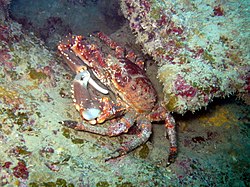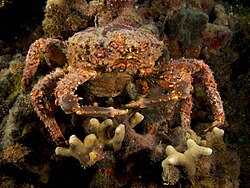Biology:Mithrax spinosissimus
| Mithrax spinosissimus | |
|---|---|

| |
| Scientific classification | |
| Domain: | Eukaryota |
| Kingdom: | Animalia |
| Phylum: | Arthropoda |
| Class: | Malacostraca |
| Order: | Decapoda |
| Suborder: | Pleocyemata |
| Infraorder: | Brachyura |
| Family: | Mithracidae |
| Genus: | Maguimithrax |
| Species: | M. spinosissimus
|
| Binomial name | |
| Maguimithrax spinosissimus Lamarck, 1818
| |
| Synonyms [1] | |
| |
Maguimithrax spinosissimus,[2] also known as the Caribbean king crab,[3] West Indian spider crab, channel clinging crab, reef or spiny spider crab, and coral crab, is a species of spider crab that occurs throughout South Florida and across the Caribbean Islands.[4][5]
Diet
The diet of this crab is largely unknown; however, it is considered a large omnivore that has been noted to feed on algae and carrion.[6] Unlike crabs such as the blue crab, the West Indian spider crab is not commercially harvested for its meat.[4]
Description
M. spinosissimus has a reddish-brown carapace and walking legs. The claws are smooth, purplish gray, with a single row of nodules along the outer edge, and blunt claw tips. The legs are covered with numerous short spines and nodules. It is the largest native crab species of the Atlantic. It can reach up to 3 kg of weight and a carapace length of 18 cm.[3]
Distribution
M. spinosissimus is found from North Carolina to Venezuela. It inhabits caves and reef underhangs from the shallow intertidal to depths of up to 200 m.[3]
It was made the type species of a separate genus Maguimithrax by Klompmaker et al. (2015).[7]
Human intervention
Mote Marine Laboratory in Florida is spawning the crabs in hopes they will eat algae and benefit coral reefs.[8][9]
References
- ↑ Peter K. L. Ng; Danièle Guinot; Peter J. F. Davie (2008). "Systema Brachyurorum: Part I. An annotated checklist of extant Brachyuran crabs of the world". Raffles Bulletin of Zoology 17: 1–286. Archived from the original on 2011-06-06. https://web.archive.org/web/20110606061453/http://rmbr.nus.edu.sg/rbz/biblio/s17/s17rbz.pdf.
- ↑ WoRMS Editorial Board (2023). World Register of Marine Species. doi:10.14284/170. https://www.marinespecies.org/aphia.php?p=taxdetails&id=987079#vernaculars. Retrieved 4 August 2023.
- ↑ 3.0 3.1 3.2 Turini, Tassia; Colavite, Jéssica; Bolaños, Juan A.; Hernández, Jesús Enrique; Baeza, Juan Antonio; Santana, William (May 2021). "Larval development of the Caribbean king crab Maguimithrax spinosissimus (Lamarck, 1818), the largest brachyuran in the western Atlantic (Crustacea: Decapoda: Majoidea)". Journal of the Marine Biological Association of the United Kingdom 101 (3): 577–589. doi:10.1017/S0025315421000515.
- ↑ 4.0 4.1 Wilber, Dara H.; Wilber, T. Payson Jr. (1991). "Environmental influences on the growth and survival of West Indian spider crabs Mithrax spinosissimus in culture". Journal of Experimental Marine Biology and Ecology 146 (1): 27–38. doi:10.1016/0022-0981(91)90253-S.
- ↑ Humann, Paul; DeLoach, Ned (2002). Reef Creature Identification: Florida Caribbean Bahamas (2nd ed.). Jacksonville, FL: New World Publications. pp. 224–225. ISBN 978-1-878348-31-9.
- ↑ Wilber, Dara H.; Wilber, T. Payson Jr. (1989). "The effects of holding space and diet on the growth of the West Indian spider crab Mithrax spinosissimus". Journal of Experimental Marine Biology and Ecology 131 (3): 215–222. doi:10.1016/0022-0981(89)90113-5.
- ↑ Klompmaker, Adiël A.; Portell, Roger W.; Klier, Aaron T.; Prueter, Vanessa; Tucker, Alyssa L. (2015). "Spider crabs of the Western Atlantic with special reference to fossil and some modern Mithracidae". PeerJ 3: e1301. doi:10.7717/peerj.1301. PMID 26557432.
- ↑ Kuizon, Kimberly (12 September 2023). "Mote Marine Laboratory Aquaculture Research Park breeding Caribbean King Crabs to help with coral restoration". WTVT. https://www.fox13news.com/news/mote-marine-laboratory-aquaculture-research-park-breading-caribbean-king-crabs-to-help-with-coral-restoration.amp.
- ↑ Jones, Benji (27 September 2023). "Scientists will unleash an army of crabs to help save Florida's dying reef". Vox. https://www.vox.com/down-to-earth/2023/9/27/23883039/florida-coral-reef-caribbean-king-crabs-restoration.
External links
- Photos of Mithrax spinosissimus on Sealife Collection
Wikidata ☰ Q5221072 entry
 |



